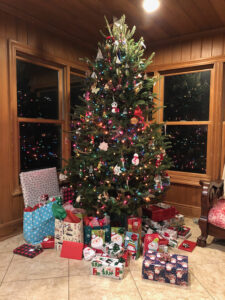
Four hours before the incident, all is well.
When we have lived where snow is possible at Christmas, we have always felt a little sorry for those in warmer climates. I remember a deep-snow winter in my Southern Illinois childhood that broke all records, and every Christmas since, the kid that I was emerges from the playroom in my brain to look hopefully out the windows.
That is strange, because for years we lived in Louisiana and Miami, and there were Army postings to southern places, even equatorial Panama. One year I spent part of December and January traveling in Vietnam. Even Southern Illinois is considered a “humid subtropical” climate. I do not know how the conditioning for snow happened so quickly and permanently, but I love it.
Christmas on the Gulf can be great too, though. There is the smell of the sea, or at least the ship channel. It is technically dry season, with nights that can be cool enough for a fire, and days as sunny and calm as retirees dream of.
Those are not the current conditions in southwest Louisiana. It has been raining off and on for weeks, with occasional straight winds and stronger gusts that remind too much of two recent hurricanes that devastated the region. It has mostly been too warm to use the furnace, and too cold for AC, which means humidity stays high indoors. The lizards are out, looking froggy when you investigate what is rustling, instead of sleeping it off wherever lizards go in the cold.
The mosquitoes are bad, too, from standing water, even in the house. These are super-intelligent, stealth-cloaking monsters, which evade all slaps and handclaps and disappear in thin air. I heard Hugo Chavez set them loose to bring down the free market. I classify them by location. The worst variety is the toilet mosquito, which bothers you in private moments, when you are most vulnerable. They land on a wall, you lean over to hit them, and they stain the wall. They are as full of blood as ticks, so you know they got you but do not know where they were before they did.
Thank goodness for the Christmas tree, bringer of joy and emotional warmth, driven down on a truck from Mississippi or North Carolina. Its tiny lights and ornaments collected for decades infuse the subtropical house with seasonal cheer, even if you can see the warm, wet road and piles of hurricane debris past it through the windows.
It was a shame when one of our cats brought ours crashing to the ground at 2 a.m. on Christmas morning. He ran out of the wreckage, shocked and dismayed.
“Dad, something bad happened,” he said. “I was chasing a lizard chasing a mosquito, and I think the lizard upset the tree.”
He is a northern cat, rescued long ago from a wintry golf course and adopted from the cold cages of the local shelter. I felt sorry for him, this odd Christmas in a hard year, and let him sleep the remaining hours until dawn on my pillow, his claws lightly pressed into my scalp for reassurance.
